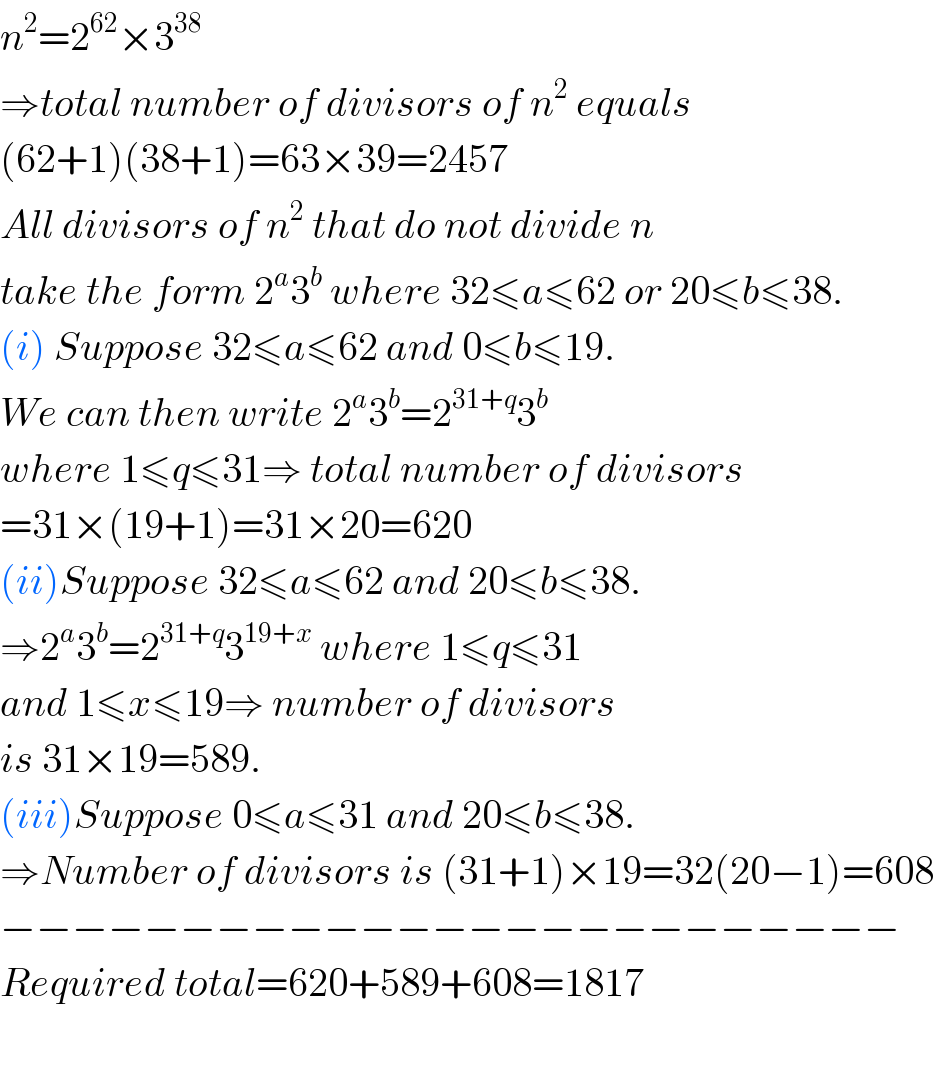
Question Number 7750 by Tawakalitu. last updated on 13/Sep/16

$${Let}\:{n}\:=\:\left(\mathrm{2}^{\mathrm{31}} \right)\:×\:\left(\mathrm{3}^{\mathrm{19}} \right)\:{how}\:{many}\:{positive}\:{integer} \\ $$$${divisors}\:{of}\:{n}^{\mathrm{2}} \:{are}\:{less}\:{than}\:{n}\:{but}\:{do}\:{not}\:{divide}\:{n} \\ $$
Commented by Yozzia last updated on 13/Sep/16

$${n}^{\mathrm{2}} =\mathrm{2}^{\mathrm{62}} ×\mathrm{3}^{\mathrm{38}} \\ $$$$\Rightarrow{total}\:{number}\:{of}\:{divisors}\:{of}\:{n}^{\mathrm{2}} \:{equals}\: \\ $$$$\left(\mathrm{62}+\mathrm{1}\right)\left(\mathrm{38}+\mathrm{1}\right)=\mathrm{63}×\mathrm{39}=\mathrm{2457} \\ $$$${All}\:{divisors}\:{of}\:{n}^{\mathrm{2}} \:{that}\:{do}\:{not}\:{divide}\:{n} \\ $$$${take}\:{the}\:{form}\:\mathrm{2}^{{a}} \mathrm{3}^{{b}} \:{where}\:\mathrm{32}\leqslant{a}\leqslant\mathrm{62}\:{or}\:\mathrm{20}\leqslant{b}\leqslant\mathrm{38}. \\ $$$$\left({i}\right)\:{Suppose}\:\mathrm{32}\leqslant{a}\leqslant\mathrm{62}\:{and}\:\mathrm{0}\leqslant{b}\leqslant\mathrm{19}. \\ $$$${We}\:{can}\:{then}\:{write}\:\mathrm{2}^{{a}} \mathrm{3}^{{b}} =\mathrm{2}^{\mathrm{31}+{q}} \mathrm{3}^{{b}} \\ $$$${where}\:\mathrm{1}\leqslant{q}\leqslant\mathrm{31}\Rightarrow\:{total}\:{number}\:{of}\:{divisors} \\ $$$$=\mathrm{31}×\left(\mathrm{19}+\mathrm{1}\right)=\mathrm{31}×\mathrm{20}=\mathrm{620} \\ $$$$\left({ii}\right){Suppose}\:\mathrm{32}\leqslant{a}\leqslant\mathrm{62}\:{and}\:\mathrm{20}\leqslant{b}\leqslant\mathrm{38}. \\ $$$$\Rightarrow\mathrm{2}^{{a}} \mathrm{3}^{{b}} =\mathrm{2}^{\mathrm{31}+{q}} \mathrm{3}^{\mathrm{19}+{x}} \:{where}\:\mathrm{1}\leqslant{q}\leqslant\mathrm{31} \\ $$$${and}\:\mathrm{1}\leqslant{x}\leqslant\mathrm{19}\Rightarrow\:{number}\:{of}\:{divisors} \\ $$$${is}\:\mathrm{31}×\mathrm{19}=\mathrm{589}. \\ $$$$\left({iii}\right){Suppose}\:\mathrm{0}\leqslant{a}\leqslant\mathrm{31}\:{and}\:\mathrm{20}\leqslant{b}\leqslant\mathrm{38}. \\ $$$$\Rightarrow{Number}\:{of}\:{divisors}\:{is}\:\left(\mathrm{31}+\mathrm{1}\right)×\mathrm{19}=\mathrm{32}\left(\mathrm{20}−\mathrm{1}\right)=\mathrm{608} \\ $$$$−−−−−−−−−−−−−−−−−−−−−−−−− \\ $$$${Required}\:{total}=\mathrm{620}+\mathrm{589}+\mathrm{608}=\mathrm{1817} \\ $$$$ \\ $$
Commented by Tawakalitu. last updated on 14/Sep/16

$${Thanks}\:{so}\:{much}\:{for}\:{your}\:{time}\:{sir}. \\ $$
Commented by Tawakalitu. last updated on 14/Sep/16

$${I}\:{really}\:{appreciate}. \\ $$
